




 |
   |
 |
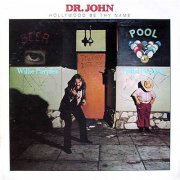 |
Hollywood Be Thy Name (1975, 40.20) ***/T |
|
| New Island Soiree Reggae Doctor The Way You Do the Things You Do Swanee River Boogie Yesterday Babylon Back by the River |
Medley: It's All Right With Me Blue Skies Will the Circle Be Unbroken Hollywood Be Thy Name I Wanna Rock |
|
Current availability:
Chamberlin used:
Mac "Dr John" Rebennack's (1941-2019) career began in his teens in the '50s, doing sessions in his native New Orleans before inventing his Creole Witchdoctor alter-ego, Dr John the Night Tripper, in the late '60s. After a move to L.A., his mangrove stew of soul, r'n'b, psychedelia, voodoo, jazz and anything else that took his fancy caught on quickly, 1972's Gumbo breaking him through to the world at large.
1975's Hollywood Be Thy Name was his first live album, although a few tracks sound as if they were put together well away from the stage. It typifies his style, taking standards and making them his own, combining them with traditional Louisiana songs and his own compositions in a live setting, complete with indispensible brass section. Ken(ny) Ascher (John Lennon, Airto Moreira) plays Chamberlin, with strings on an almost unrecognisable version of The Beatles' Yesterday, although (unless it's hidden away somewhere else) that would seem to be it.
 |
Doctor Pop (1973, 32.48) ***½/TTTIntroducción - Lady GentilCapricho Español Barbacoa Minuetto Peer Gynt America, America Danza de Macgregor Desperté Sin ti Temptation |
Current availability:
Mellotron used:
Doctor Pop were a Spanish outfit who released a single in 1973 as Anacronism, both sides of which ended up on the same year's Doctor Pop after a name-change. How to describe this? Pop/prog, Spanish style? Clearly accomplished musicians, they shifted between classical pieces, flamenco, cheesy mainstream Latin pop and vaguely Styx-like progressive pop, before anyone had even heard of Styx, let alone in Spain. Highlights include the two-minute-plus Introducción, a piece for massed monosynths, the prog/flamenco crossover Capricho Español, complete with two-minute (!) drum solo, the mad Desperté Sin Ti and vaguely funky closer Temptation, featuring a riff that's first cousin to Focus' Hocus Pocus.
The unknown keyboard player (no specific credits here) slathers Mellotron strings all over Introducción - Lady Gentil, with string and choir parts on Minuetto, strings on Peer Gynt and Danza De Macgregor and strings and choirs on Desperté Sin Ti and Temptation, making for a startlingly Mellotron-heavy release. This is a truly bonkers record; near-impossible to find a physical copy, I'd imagine, but it's on YouTube. I urge you to make the effort.
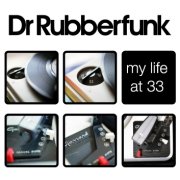 |
My Life at 33 (2006, 52.04) **½/T |
|
| Live Wired Taking Over Theme for a Latter-day Lothario Baby Bossa Watch the Tables Turn The Rooster All Day Playing Riding With the Ratman |
Blow Away the Grey Minus Three and Falling Father's Lament |
|
Current availability:
Mellotron used:
Dr Rubberfunk is the nom-de-plume of Simon Ward, a British DJ/hip-hop type whose took his first musical steps in the late '80s, becoming Rubberfunk in 2001. 2006's My Life at 33 (r.p.m., of course) mixes'n'matches influences with gleeful disregard for convention; all well and good if that's what you're after, but his approach will probably turn off more than it'll turn on. Two credited Mellotron tracks, with Ward adding real-sounding strings and a flute line to All Day Playing, although there's nothing audible on Father's Lament.
See: Samples etc.
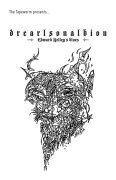 |
Edward Kelley's Blues (2012, 49.33) ***/T½Edward Kelley's BluesDrunk on Angelspeech |
Current availability:
Mellotron used:
Dylan Carlson is mainman of Earth, also contributing to Sunn O))) and other projects, including drcarlsonalbion. Edward Kelley's Blues refers to self-proclaimed seer and bullshit artist Edward Kelley, assistant to Queen Elizabeth's advisor John Dee; the few lyrics apparent on the title track are translated into Enochian on the flip, the 'language' Dee apparently used to speak with angels. According to his label, The Tapeworm, the title track consists of '...field recordings made in/around Waterloo station and along the Thames river bed at Southbank...', with guitar (drone, of course) and vocals added later, while side two's Drunk On Angelspeech sounds like a louder version of the 'A' with extra added mumbled Enochian and Mellotron.
Speaking of which, Robert Roth (Built to Spill, Truly) plays his M400 on Drunk On Angelspeech, with distant, screeching strings bellowing atonalities throughout much of the side, although the end result, sadly, is akin to the old saw 'full of sound and fury, signifying nothing' (albeit not told by an idiot). I'm amused to see that, after the initial pressing of four hundred sold out in the blink of an eye, The Tapeworm produced another two hundred reverse-colour copies (white on black), called the 'Obsidian Mirror' edition, in honour of Dee's black mirror (now in the British Museum, although its provenance is apparently dubious), also referenced on Sandy Pearlman/The Blue Öyster Cult's Imaginos. Is Carlson a fan? I'd like to think so.
See: Earth | Robert Roth
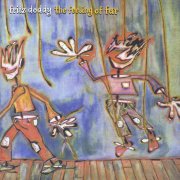 |
The Feeling of Far (2004, 58.54) ****½/TTT½ |
|
| Cynical Eye Amieveliano The Feeling of Far It's Only a Dream All the Best In the Tree Over You God is Hiding |
Nothing But Laughter The Lonely Path Cynical Eye (radio mix) It's Only a Dream (radio mix) |
|
 |
Calm (2021, 43.57) ***½/½ |
|
| Butterfly Untitled No. 37 The Solitary One Gently A Very Big Garden A Boy Can Dream We Fix it, Always Le Stelle Ballano |
Song for Pat Escher's Tale |
|
 |
The Gardener (2025, 48.17) ****/TTT |
|
| Goodbye Holidays Inside a Little Box The Break of the Day Playing Grandmother's Footsteps The Gardener Searching for Happiness Complicated He Made Little Gifts |
The Boy Next Door Song for Alton Blue 2.0 |
|
Current availability:
Mellotrons used:
Fritz Doddy makes music for a living, but hasn't allowed the experience to affect his ability to produce a personal, heartfelt album in The Feeling of Far. All the right influences are present and correct; The Beatles, Big Star, Jellyfish even, all of which add up to a near-perfect album of 'intelligent pop', for want of a better phrase. Impeccably put together, the album is pretty much a 'how to' primer for anyone wishing to work in the field, although I suppose Fritz has an unfair advantage in his years of experience producing music for others. And this is a problem? The songwriting, playing and production are all spot-on, giving the impression of a big-production major label effort, rather than the completely homegrown artefact it actually is.
All sorts of people guest, including Susan McKeown, herself an occasional samplotron user; it seems that Fritz's entire family appear somewhere or other, including his dad shouting at him (!) and even his dog. Fritz plays his (very real) Mellotron on several tracks, sticking mainly to the familiar strings and flutes, although a couple of choir chords sneak in here and there. He resists the temptation to overuse it, too, unlike a few I could name, with a sizeable Mellotronless chunk around the middle of the record. Of particular note are the string intro and 'Strawberry Fields' flutes of Cynical Eye and the flutes on the title track, although all the Mellotron work is (along with just about everything else here) quite exemplary. My only gripe (and it's a very small one) is the wisdom of putting radio edits of two tracks on the end; as Fritz says in his liner notes, "I mixed this album to flow with minimal interruptions of silence and I think it's best enjoyed when listened to from beginning to end", which is slightly disrupted by the 'bonus' tracks. Oh well; hit the 'stop' button after track ten if you're that bothered. Fritz actually gave me my copy of The Feeling of Far when we met up in London in earlyish 2005. He really is the nicest chap you can imagine, which has absolutely nothing to do with my review; he did say, "Be honest" and I have been. This really is an excellent piece of work, which I unequivocally recommend to anyone who appreciates good songwriting with a largish side-helping of Mellotron. No, really. Fritz even drinks British beer and does a passable London accent. What can I say? Buy.
After almost twenty years, 2021's Calm is little like The Feeling of Far, being an album of laid-back instrumental music, characterised by sweeping strings and melodies that, well, could well be influenced by the same powerpop heroes as before. It might just be at its best on opener Butterfly and Le Stelle Ballano, but picking out highlights is a fairly fruitless task. Fritz tells me his Mellotron was used, but the only definite sighting is the choppy choirs on A Very Big Garden, all string and flute parts sounding either real, or well-arranged samples.
After another four years (and a worldwide pandemic), 2025's The Gardener, is, according to Fritz's Bandcamp page, "...a musical love letter to my friends, my family, and especially my father. It's taken me over 15 years to condense a lifetime of emotions into 48 minutes". A startlingly beautiful album, utilising similar influences to his first release, this might just be at its best on the serene, instrumental title track, The Boy Next Door and closer Blue 2.0. If this intensely personal record has a fault (sorry, Fritz), He Made Little Gifts and Song For Alton seem to miss the mark, albeit only musically, their contemporary, cut-up sample-based techniques jarring a little with the overall feel. Plenty of Mellotron, with melodic flute and string parts on Inside A Little Box and Searching For Happiness, flutes on The Break Of The Day and Playing Grandmother's Footsteps, chordal strings on Complicated and high strings on Blue 2.0. The beauty of Bandcamp is the listener's ability to audition an album before purchasing. I can only urge you to do both.
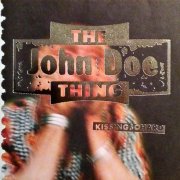 |
Kissingsohard (1995, 49.12) ***/T |
|
| Fallen Tears Safety Love Knows My Goodness Tragedy By Definition Kissing Hits the Ground Going Down Fast |
T.V. Set Beer. Gas. Ride Forever Field of Dirt Williamette Liar's Market |
|
Current availability:
Chamberlin used:
John "Doe" Duchac is an ever-present member of LA (kind of) punks X, running a concurrent solo career since 1990. '95's Kissingsohard (as The John Doe Thing) was his second solo release, sounding not dissimilar to later X albums, combining elements of punk, alt.rock and country, highlights including the propulsive Love Knows, the dark Kissing and the countryesque Field Of Dirt.
Patrick Warren, in one of his earlier tape-replay sessions, plays Chamberlin, with strings on opener Fallen Tears and flutes on Hits The Ground, although the strings on Field Of Dirt appear to be real. While good at what it does, I can only really recommend this to fans of X or '90s alt.rock, while its Chamberlin use is nowhere near overt enough for hardcore tape-replay fans.
See: X
 |
The Dog That Bit People (1971, 44.36) ***/TT |
|
| Goodbye Country The Monkey and the Sailor Lovely Lady Sound of Thunder Cover Me in Roses Someone, Somewhere A Snapshot of Rex Red Queen?s Dance |
Mr Sunshine Tin Soldier Walking Reptile Man |
|
Current availability:
Mellotron used:
When organist Norman Haines left Locomotive to form The Norman Haines Band (subsequently producing the fab Den of Iniquity), bassist Michael Hincks and drummer Bob Lamb added two guitarist/vocalists and formed The Dog That Bit People. Their sole, eponymous album from '71 is the kind of stylistic mish-mash that usually gets labelled 'progressive' these days, despite having next to nothing in common with the brand leaders. OK, I suppose it's 'progressive' compared to the mainstream pop and rock of the day, but it's not a particularly adventurous album, opening badly with the overly gentle Goodbye Country, while halfway decent proto-prog like Cover Me In Roses is followed by the good-time country-rock of Someone, Somewhere. Closer Reptile Man is the most rocking thing here, with its distorted vocal, but it's a case of too little, too late.
Keith Millar plays Mellotron, with a string part towards the end of opener Goodbye Country, more of the same (endearingly out of tune) on Cover Me In Roses and (in tune this time) Walking. Overall, then, The Dog That Bit People isn't a hidden artefact from the era, just a rather ordinary album with a couple of good points, just scraping three stars, with some welcome Mellotron work.
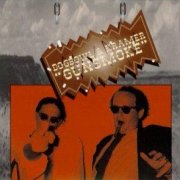 |
Gunsmoke (1995, 40.56) ***/T½ |
|
| Pollyana Penelope Gunsmoke I'm Not Insane Nothing Better Huge, Horrible Carrot She and Me Paperman Cindy on the Sidewalk |
Waiting Room Blue Fallen Angel (of Amsterdam) Goin' to the Hashbar |
|
Current availability:
Mellotron used:
Stephen "Dogbowl" Tunney is a somewhat singular artist, whose superficially pretty songs conceal a seriously warped sense of humour. You don't believe me? Gunsmoke is a rumination on homosexual cowboys, years before Brokeback Mountain, Nothing Better describes both varieties of oral sex in excruciating anatomical detail, while Goin' To The Hashbar is pretty much self-explanatory. (Mark) Kramer presumably plays most of the album's instrumentation, making it unsurprising that the end result sounds a lot like his other productions, a lo-fi aesthetic running through all twelve tracks.
Kramer plays Mellotron, with muted flutes and strings on Nothing Better, flutes on Paperman, only obvious at the end of the track and more upfront flutes and strings on Waiting Room, although none of it that overt, sadly. Well, this isn't yer average album, to say the least, but if you like the sound of lo-fi, (deliberately) lowbrow humour with a smattering of muffled Mellotron, you might just go for this.
See: Kramer
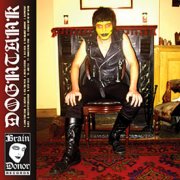 |
Døgntank (2006, 42.04) ****/TT½ |
|
| Long Time Dead Lucifer Feel the Pain Weird Sisters Bad Sign The Unjust Survive Outpatient Blues Waitin' 4' Tomorrow |
Deep Seed Job 2:6 Wandering Star Stoned Out of My Mind |
|
Current availability:
Mellotron used:
Døgntank is Julian Cope associate Anthony "Doggen" Foster's solo project, whose eponymous 2006 release is mostly a (clearly deliberate) spot-on copy of any number of mid-to-late '70s American hard rock albums, just before Van Halen's iconic debut turned the scene on its head. Is this irony? Homage? Both? This is like finding acetates of an unheard Y&T album in an attic, or hearing an unreleased Ted Nugent session recorded between his debut and Free for All, only without The Nuge. They've got the era's production techniques down pat; spot the stereo echo on Weird Sisters, just before the double-tracked guitar solo. YES! I know people whom, were I not to tell 'em it's a pastiche, would love this to bits. Things actually go slightly awry towards the end (on purpose?), Job 2:6 (complete with solo trumpet part) sounding too much like Spiritualized for its own good (never a good thing), while Neil Young-esque balladic closer Stoned Out Of My Mind is a little inauthentic for the genre, but these are minor quibbles in the grand scheme of things.
Cope plays Mellotron, with choirs on Lucifer, background strings on Outpatient Blues, upfront cellos on Job 2:6, a string part on Wandering Star and high-end cellos on Stoned Out Of My Mind, all in his usual 'non-prog' style. Listen, you have to hear this for its sheer chutzpah, not to mention the fact that this is actually better than many of the albums it's emulating/referencing, amusingly. Contrary to popular opinion, I'm not quite stupid enough to take this seriously, any more than Doggen and co. have, but Døgntank was obviously a fuckload of fun to write and record, not to mention to listen to, with a reasonable amount of Mellotron to keep people like me happy. Recommended.
See: Julian Cope | Sons of T.C. Lethbridge
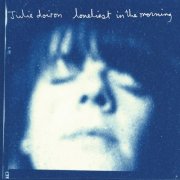 |
Loneliest in the Morning (1997, 37.03) ***½/T½ |
|
| So Fast Dance Me Sorry, Part 1 Tell You Again Explain Crying Baby Sweeter Tonight We Sleep |
Mother Love to Annoy Creative Depression Sorry, Part 2 Condescending You Le Soleil |
|
Current availability:
Mellotron used:
After a spell in Eric's Trip, Julie Doiron released Broken Girl under that name in 1996, producing Loneliest in the Morning the following year. It's an incredibly sparse album, largely consisting of Doiron's broken tones (Broken Girl indeed) accompanied by her own guitar, with hints of other instrumentation dipping in and out of the mix. My main criticism would be that there's a certain sameyness to many of the tracks, although I'm sure their separate identities become apparent on repeated plays and no, I'm not being sarcastic. For once. Originally released on Sub Pop, it's now available, expanded, on Jagjaguwar and is definitely worthy of being kept on catalogue.
Howe Gelb of Giant Sand and Doug Easley both play Mellotron, although, despite the album's overall emptiness, it's not always easy to determine exactly where it's being used, as distant sustained guitar sounds infuriatingly similar to Mellotron cellos when low in the mix (see: Sorry, Part 1). The two definite sightings, though, are the woefully (deliberately?) out-of-tune flutes towards the end of Mother and a distinct cello arrangement on Sorry, Part 2. This is an album for the very quietest person you know, I suspect. It could be seen as depressing, or oddly uplifting in a downbeat kind of way, depending on your viewpoint, but I'm certain the songs will grow on me in the unlikely event that I should ever find the time to play this more often. Good album, passable Mellotron, your choice.
 |
Motel Swim (1998, 37.54) ***½/T |
|
| The Sound of Cologne Respirator One Revolution (Around the World) A Viper in Hiding Motel Swim Gulliver Diver Advanced Japanese Candlestick Man Hang Around in Your Head |
All Winter Long Down Tiger, Down Tiger |
|
Current availability:
Chamberlin used:
The Doleful Lions are a powerpop outfit in the grand tradition, with an occasional indie tinge in places. Their debut, 1998's Motel Swim, is very likeable, if somewhat in thrall to their forebears, which is a nice way of saying they're a little unoriginal, but, if the songs are good, does it matter? Top tracks include opener (as you'd expect) The Sound Of Cologne, full of references to their krautrock faves, the title track, Hang Around In Your Head and All Winter Long, although there are no duffers, which is quite a result in itself.
Jeff Hart plays Fidelitorium Studios' Chamberlin, with strings on One Revolution (Around The World), including an unfeasibly-sustained high note, which sounds like some form of studio trickery.
 |
The Dumbest Magnets (2000, 43.04) ***½/T |
|
| Apple Doll The Thing You Love is... The Dumbest Magnets Second Chance Progressive Note I Come to You Balcony Be a Part |
Along for the Ride Too Good to Believe Some Sequined Angel Simple Pleasure |
|
Current availability:
Mellotron used:
One of the joys (or otherwise) of reviewing so many essentially random albums is frequently not having the faintest idea what a band may sound like before hitting 'play'. More often than not, they're indie, or that dreadful post-rock/pop crossover area, but every now and again, it all comes out in the wash. Dolly Varden (named for a mode of dress popular for a few years in the Victorian period, itself named after a Dickens character) are led by husband/wife team Steve Dawson (not the Canadian Americana guy) and Diane Christiansen, who share lead vocal duties. They play a very acceptable form of Americana, at least on their third album, 2000's The Dumbest Magnets, top tracks including opener Apple Doll, the rockier I Come To You and closer Simple Pleasure. To be honest, there isn't actually a duff effort here, which makes a welcome change.
Drummer Matt Thobe plays Mellotron, with strings all over the title track and occasional ones on Some Sequined Angel. Real? As so often, almost impossible to say, although the overly-consistent attack is a little suspect, frankly. Do you bother with this? Do you like Americana? It's pretty much that simple, although not worth it for the possibly-not-even-real Mellotron.
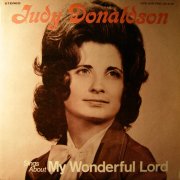 |
Sings About My Wonderful Lord (197?, 27.25) ½/TT |
|
| My Wonderful Lord The Way That He Loves He Never Has Failed Me Yet Till There Was Jesus Something Worth Living for I'd Rather Have Jesus There's a Deep Settled Peace Above All Else |
I've Found the Way My Heavenly Father Watches |
|
Current availability:
Mellotron used:
Judy Donaldson's the latest site entry from the seemingly-inexhaustible well (black pit?) of squeaky-clean, Christian slop from an unidentifiable point in the mid-'70s. It's every bit as horrible as almost everything else my good friend (?) Mark Medley sends me, lovingly digitised from thrift-shop vinyl, presumably before being destroyed. Hopefully with extreme prejudice. Upon opening Mark's jpeg of the sleeve, I actually jumped in my seat, an involuntary "Urh!" escaping my lips at the sight of the fragrant Ms. Donaldson (not that Christians ever use 'ms.', of course. Far too liberal). The rear sleeve actually manages to outdo the front (well, almost), picturing Judy's lovely family (I'll spare you), one of whom looks brain-damaged. Don't tell me, don't tell me, she IS brain-damaged, right? And I'm going to rot in hell? Whatever.
The contents of this horror (engineered by Jay Petach, incidentally, Mellotron player for the likes of The Regals) are, to absolutely no-one's surprise, the kind of whiter-than-white, rhythm-free 'gospel' (no drums. Too black) that bears precisely zero musical comparison with the genuine article. The lyrics? Guess. For some reason, this is actually nastier than most similar, or is it simply that I haven't heard any of this crud lately, losing my natural immunity? Anyway, one Margie Vangilder plays electric piano, organ and 'Melotron', with pseudo-orchestral strings on opener My Wonderful Lord, more of the same on I'd Rather Have Jesus, There's A Deep Settled Peace and My Heavenly Father Watches, improving them not one jot. Horrible, horrible, horrible.
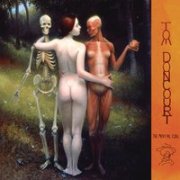 |
The Mortal Coil (2014, 56.28) ****/TTTT |
|
| House in Paradise Black Square Golden Crown Breaking Up in Bali Constellation Orpheus Which Fades Faster? Darkness of Wings Defy Gravity From Under the Ground Highway 3000 |
Horde of Bones Moon Turns Orange Then Green Philosophers Path Princess Reindeer Ragged Light Whirlpool |
|
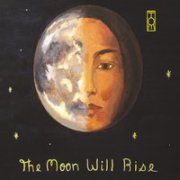 |
The Moon Will Rise (2015, 50.22) ***½/TTTT |
|
| Diorama First The Curtain A Trip to Oregon, pt. 1 April Secret River Moon and Sixpence A Trip to Oregon, pt. 2 |
Skeletons of Penn Station Maps Torn A Trip to Oregon, pt. 3 |
|
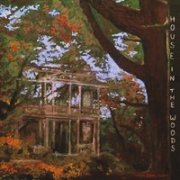 |
House in the Woods (2017, 52.08) ****/TTTT½ |
|
| The Breeze By the Bay Frontier River Reed Especially for You Magical Thinking House in the Woods Medicine Buddha How We Face the Wave |
Turning Moon in the Garden Abandoned Gallery |
|
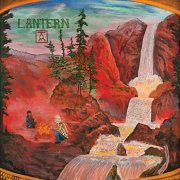 |
Lantern (2020, 41.26) ***½/TTT |
|
| Treetops Lantern Invisible Fire Barrier Constellation Orpheus The Vine Stone Teotihuacan |
Lost on Long Island Plasma |
|
Current availability:
Mellotrons/Chamberlin used:
Tom Doncourt played keyboards with legendary one-shot US proggers Cathedral, in both their original and reformed incarnations, later releasing the sole FauveMuseum album. 2014's The Mortal Coil is his first solo release, its fourteen relatively short compositions probably best described as progressive songs, for want of a better phrase; mostly in the three-to-four-minute bracket, yet complex and inventive enough to fit the broader definition of progressive rock. Echoes of Discipline-era Crimson and Talking Heads reverberate around the record, elements of various electronic and 'ethnic' musics cropping up in places, highlights including Breaking Up In Bali, Constellation Orpheus, Defy Gravity From Under The Ground and the angular Horde Of Bones.
Tom plays both his M400 (the original Cathedral machine) and his Chamberlin M1 on all but one track, with (all Mellotron?) strings on House In Paradise, Black Square Golden Crown, Constellation Orpheus and Which Fades Faster?, strings and (Chamby?) flutes on Breaking Up In Bali, strings and flute lines (quite distinct from the real flute heard on a few tracks) on Darkness Of Wings, Defy Gravity From Under The Ground and Princess Reindeer, cello, (Chamby?) strings and Mellotron church organ on Horde Of Bones, background strings and flutes on the ambient Moon Turns Orange Then Green, strings and cellos on Philosophers Path, flutes and Chamby strings on Ragged Light and strings and brass on Whirlpool. Enough tape-replay for you? To my ears, Tom's album works best when he incorporates both light and shade into a composition, a couple of lighter pieces working less well, but, overall, something of a triumph.
The following year's The Moon Will Rise continues down Tom's song-based progressive rock journey, highlights including The Curtain, Moon And Sixpence and lengthy closer A Trip To Oregon, Pt. 3. Tom's added a new M4000 Mellotron (the real one, not that jumped-up sample player from Sweden), playing it and his Chamby with strings on most tracks, plus a flute run on Diorama, flutes and choir on Skeletons Of Penn Station and upfront flutes on Torn. 2017's House in the Woods sees Tom's muse strengthen, highlights including opener The Breeze By The Bay, Especially For You, Turning and closer Abandoned Gallery. Mellotron and/or Chamberlin strings of one kind or another on almost every track, plus flutes on River Reed, flutes and choir on How We Face The Wave and brass on Turning.
p.s. I'm very sad to report that Tom died on March 20th, 2019, aged sixty-three. Not only did we correspond several times, but I know several people who knew him, all of whom attest to his thorough decency. He had just bought Woolly Wolstenholme's old M300 when he died, which has now, at the express wish of his widow, been donated to Abbey Road Studio, where I hope it will get the use it deserves. RIP, Tom.
As a second (and final) postscript, Maxine, Tom's widow, released the album he finished mere days before his death, Lantern, in early 2020, a year later. Fitting broadly into the above description ('progressive songs'), its female-fronted contents are probably at their best on the beautiful title track, Constellation Orpheus and the propulsive Lost On Long Island; essentially, I think it's safe to say that if you like Tom's earlier releases, you'll like this. As ever, it's not always easy to tell what's Mellotron and what's Chamberlin, but we get strings from one of his three tape-replay instruments on all highlighted tracks above, some examples more upfront than others, plus Mellotron church organ on Barrier and Mellotron choirs on Constellation Orpheus. As long as you approach this knowing that it has little in common with Tom's work with Cathedral, I think you'll agree with me that it's a fine last will and testament. Thank you, Tom.
See: Cathedral | FauveMuseum | Quiet
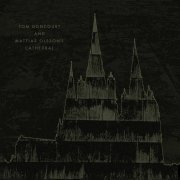 |
Tom Doncourt & Mattias Olsson's Cathedral (2020, 35.57) ****½/TTT½Poppy Seeds IntroPoppy Seeds Chamber #1 Tower Mews Today Poppies in a Field The Last Bridge Organ |
Current availability:
Mellotron/Chamberlins used:
Cathedral's Tom Doncourt (above) was most of the way through recording an album with Änglagård's Mattias Olsson when he died in March 2019. Honouring their collaboration, Olsson finished the album, bringing in several guests, titling it Tom Doncourt & Mattias Olsson's Cathedral, which seems about right, given how much of an influence they were on Änglagård. The end result combines classic symphonic progressive tropes with elements of the differing areas in which both musical partners have worked in recent years, including electronica and dream pop, making for an eccentric, yet satisfying whole. But does it work? The answer is a resounding 'yes', although Tom's vocals on Poppies In A Field won't appeal to all listeners; they come as a bit of a surprise on what looks, at that point, like an instrumental record.
The album's format is a rather odd 'six short/two long', none of the shorter material topping three and a half minutes, making for several musical vignettes, the best of which might just be gorgeous closer The Last Bridge Organ. Other highlights? Poppy Seeds Intro brings The Beach Boys' Our Prayer to mind (deliberately?) and Chamber is a full-on Mellotron strings-fest, although Top Track award probably (and slightly predictably) goes to the ten-minute #1, a full-on, Crimsonesque burst of energy, but, in truth, there's not one bad (or even indifferent) track here.
Tom played Mellotron and Chamberlin (his own M400 and M1), while Mattias chips in on Chamby Rhythmmate, with Mellotron choirs on Poppy Seeds, strings, cellos and flutes on Chamber, strings, cellos and choirs on #1, strings and choirs on Tower Mews, flutes and strings on the brief Today, strings and a flute melody on Poppies In A Field and pitchbent strings on The Last Bridge Organ. How much of this is Tom's Chamby? Hard to tell; I'm not hearing any obviously Chamberlinic sounds, which isn't to say they aren't there. For that matter, I'm not sure where we're hearing the Rhythmmate, either, proving that, even after all these years, my tape-replay-spotting abilities are still somewhat suspect. This album is a triumph of artistry over adversity, deftly combining two separate progressive ideologies with elements that, on their own, simply shouldn't work. If you buy just one album this year, make it this one.
 |
Beautysleep (2002, 47.14) ***/T |
|
| Life is But a Dream The Storm The Night You Saved My Life Keeping You Moonbeam Monkey Wrap-Around Skirt Another Moment Darkside |
So Much Song The Wave The Shadow Head for Math |
|
Current availability:
Mellotron used:
Tanya Donelly has had a pretty high-profile career, moving back and forth between Throwing Muses, The Breeders (with the Pixies' Kim Deal) and Belly, finding success with all three, which has to be fairly unusual in itself. Oh, and she's somehow found time to squeeze in a solo career, four albums and several EPs long at the time of writing. 2002's Beautysleep is her second full-length effort, capturing that '4AD sound' perfectly; you know, laid-back yet indefinably edgy, melancholic yet positive... The album's far from short of more energetic moments: Wrap-Around Skirt lurches along, overlaid with some incongruous rockabilly guitar, while Wave builds up to a mid-paced acoustic strumalong from a slow start, along with several tracks' intros, although the record's general default setting seems to be 'slow'. Best track? Possibly 'official' closer The Shadow, a doomy effort that precedes two minutes of silence and a 'hidden' track, Head For Math.
Donelly plays what have to be high Mellotron cellos on Moonbeam Monkey and Another Moment, although they're not specifically credited. This really isn't what you'd call a Mellotron album, it has to be said, but it's good enough at what it does, although I suspect fans of the lady and her style and 4AD groupies are its most likely audience.
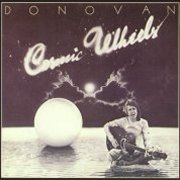 |
Cosmic Wheels (1973, 38.54) ***½/½ |
|
| Cosmic Wheels Earth Sign Man Sleep Maria Magenta Wild Witch Lady The Music Makers The Intergalactic Laxative I Like You |
Only The Blues Appearances |
|
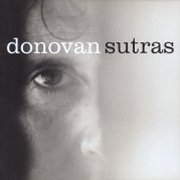 |
Sutras (1996, 50.53) ****/TT |
|
| Please Don't Bend Give it All Up Sleep Everlasting Sea High Your Love The Clear-Browed One The Way Deep Peace |
Nirvana Eldorado Be Mine Lady of the Lamp The Evernow Universe am I The Garden |
|
Current availability:
Mellotrons/Chamberlin used:
After a rather fallow, post-fame period, Donovan returned for one last real career peak with 1973's fairly cohesive Cosmic Wheels, almost entirely connected with the return of Mickie Most to the (co-)producer's chair. The puerile The Intergalactic Laxative aside, the album holds together really rather well; surely it's only a matter of time before someone covers the downtuned title track in a heavy stylee? Mellotron on one track only, Sleep, with upfront, if heavily-reverbed cellos, played by "Rabbit" Bundrick, stupidly misspelled 'Bundick', which must've cheered him up no end. Mind you, the album also credits 'Cosy' Powell on drums, so there you go.
Twenty-three years later, Sutras was Don's first album in over a decade, sadly not including any of the new material he previewed on his heroically lengthy '92 UK tour, from the idiotically-unreleased Celtia, including a genuinely brilliant song called Against Your Will. Anyway, it was produced by Def Jam supremo Rick Rubin, guests including the inimitable Danny Thompson (Pentangle, Richard Thompson), the also inimitable Benmont Tench (Tom Petty) and the slightly less inimitable but more famous Dave Navarro (Jane's Addiction, Red Hot Chili Peppers), who played both Mellotron and Chamberlin. The beautiful Everlasting Sea has Mellotron flutes alongside real cellos, The Evernow has (presumably) Mellotron flutes in a more upfront role, while Universe Am I has (I think) Mellotron flutes and Chamby woodwind, alongside real cello again. Incidentally, interesting to note that these both contain completely different songs called Sleep (both their respective album's third tracks), despite Don's penchant for dodgy re-recordings of his hits.
See: Samples etc.